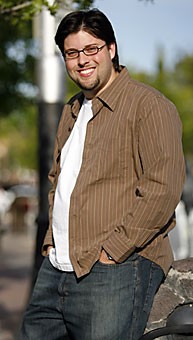When Jamie Poissant looked at the caller ID on his home phone on April 1, it said “”Playboy,”” and he was confused.
“”I thought, ‘That’s weird, why is Playboy calling me?’ “” said Poissant, a creative writing graduate student.
As he picked up the receiver, he remembered the story he submitted in November to the Playboy College Fiction Contest. The magazine editor on the other end of the line wanted to make sure Poissant was a student.
Three days later, Poissant’s wife came back from walking the dogs with a letter saying his story, “”Lizard Man,”” had won the $3,000 prize and would be published in the October 2007 issue of the men’s magazine.
“”There was a lot of ‘Oh my God’ and jumping around,”” Poissant said.
Soon after finding out, he and his wife were off to pick up her parents at the airport.
“”The whole time we were driving, I was calling everyone I know,”” Poissant said.
Rocky Rakovic, one of the magazine’s New York editors, said between 1,000 and 2,000 people submit stories to the contest every year.
Once the entry deadline passes, the editors spend a week sorting through the stories to find those that are both of high quality and suitable for the magazine’s audience.
Rakovic said Poissant, who publishes under the name David James Poissant, fit the bill with “”Lizard Man,”” a story about father-son relationships and a drive through Florida to claim a giant pet alligator.
“”There was a lot of ‘Oh my God’ and jumping around.
“”
– Jamie Poissant,
graduate student
“”David James Poissant’s story has a real quiet power to it,”” Rakovic said.
Poissant said he prefers to write stories about the way people hurt one another and struggle to redeem themselves. The tie between fathers and sons is one of his particular interests.
Aside from his role as a graduate student and instructor for the English department, Poissant also works as co-editor of the Sonora Review, a literary magazine based at the UA that publishes work from writers around the country.
This fall, he said, he and his wife are moving closer to the University of Cincinnati, where he will pursue his doctorate in English, and, he hopes, finish a novel.
The creative writing master’s program at the UA has a reputation for producing top-notch talents, including the Pulitzer Prize-winning novelist of “”Empire Falls,”” Richard Russo, and postmodern literary bad-boy David Foster Wallace, author of “”Infinite Jest.””
Poissant said getting published is difficult and there is no secret way to guarantee success, other than being persistent and making absolutely certain each piece is as good as possible.
He has collected more than 200 rejection letters in the course of his three-year career, and he said he has about 50 short stories and one finished novel that he will never submit for publication.
“”Every single sentence has to be the best it can be,”” Poissant said.
Both Poissant and Rakovic said the market for short stories gets smaller every year. For example, the Atlantic Monthly publishes two or three pieces of short fiction every year, but it used to have one in every issue.
That is why Poissant said it is getting harder and harder to be published in larger glossy magazines like Playboy.
Publishing high-quality literary pieces is more important during the digital age because “”words are at a premium,”” Rakovic said. “”It’s vital to our magazine.””
While he said he is excited about being published, Poissant is also realistic about Playboy’s readership.
“”I know not everyone reads the articles,”” Poissant said.









